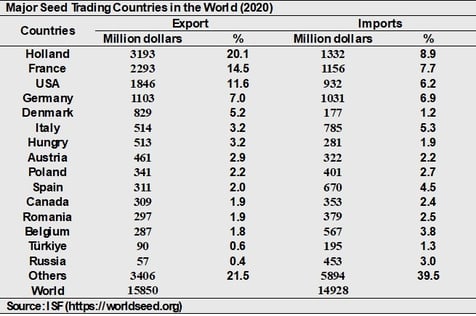Turkey's Growing Seed Industry: Quality & Innovation
Explore Turkey's evolving seed industry, a vital component of agricultural sustainability and food security. Learn how quality seed production is driving economic growth, job creation, and positioning Turkey as a leader in the global seed trade.
RURAL INNOVATION
Mithat Direk
11/9/2024


As the world’s population surpasses 8 billion, ensuring enough food for everyone becomes an urgent challenge. Access to nutritious, safe, and reliable food is essential for health, and this need makes agriculture, the foundation of all food production, a priority sector globally. Seeds are the starting point of all plant-based food; they are not only an agricultural product but also a key element in preserving biodiversity and cultural heritage. For any country, seeds hold strategic importance as they serve as a fundamental building block for agricultural productivity, economic value, and even national security.


Seeds go beyond being mere agricultural inputs; they have evolved to become products of high economic worth, crafted with advanced technology to enhance agricultural productivity. Using quality seeds suited to specific regions and implementing effective farming methods can significantly increase crop yields. Studies reveal that good-quality seeds can boost yields by 20-30% in crops like grains and legumes and up to 100% for others like corn and sunflower. Low-quality seeds, however, compromise crop output, product quality, and the final market value. To ensure high-quality yields, seeds for crops like wheat and barley need renewal every three years, while cross-pollinated crops like sunflower and corn require annual renewal. This essential element in agriculture—the genetic potential of seeds—plays a crucial role in improving yields, quality, and, subsequently, the income of farmers.
Global Seed Industry Development
Agriculture began centuries ago when people first settled in one place, and it further expanded with the discovery of hybrid seeds. This advancement marked a turning point in the history of agriculture, enabling the commercialization of seeds beyond local trade. By the 19th century, Europe and the United States initiated organized seed production, assigning economic value to quality seeds. In the 20th century, modern genetics propelled plant breeding, spurring a rise in seed variety development to increase crop productivity and quality. With hybrid technology and advancements like recombinant DNA technology, the seed sector saw rapid progress, particularly in developed countries.
As the global seed market grew, the focus on quality and efficiency prompted the establishment of national seed laboratories and quality control systems. These structures not only regulated the seed industry domestically but also encouraged international trade by developing certification standards like the OECD (Organisation for Economic Co-operation and Development) and the ISTA (International Seed Testing Association) systems. These efforts, along with breeders' rights protections, helped form a strong seed trade system, which today is critical to global food security.
Despite these advancements, until the 1970s, international seed trade was minimal, as many countries considered seeds a matter of national security. However, with globalization, seed companies in the West expanded into other regions, and the international seed trade began to flourish. The trade volume grew substantially—from $1 billion in the 1970s to $31 billion by 2020, a growth trend that continued even during the COVID-19 pandemic. Leading countries in this global trade include the Netherlands, France, the United States, and Germany.
Türkiye's Seed Industry: Historical Context and Modern Development
Türkiye’s strategic geographic location, young workforce, fertile lands, and favorable climate give it unique agricultural potential. The agricultural sector in Türkiye not only provides employment and contributes to the economy but also plays a vital role in meeting nutritional needs and bolstering exports. Seed production in Türkiye began in 1925 with the establishment of the Eskişehir Seed Breeding Station. Initially, seed production focused on cool-climate grains. However, in the 1980s, Türkiye shifted from a government-controlled seed supply to a system emphasizing private enterprise. This transformation allowed both local and foreign seed companies to invest in Türkiye, accelerating the growth of the private seed industry.
Today, Türkiye has over 1,100 registered seed companies, most of which are private, and the industry is regulated by the Ministry of Agriculture and Forestry. The majority of these companies differ in terms of their scale, capital structure, and range of products. This variety enables them to cater to Türkiye’s agricultural demands across a spectrum of crops, from grains and industrial feed to vegetables.
Türkiye’s seed sector has established significant international partnerships over the decades. In 1963, Türkiye joined the ISTA, and in 1968, it became part of the OECD certification system for field and forage crops. These certifications ensure that seeds produced in Türkiye meet international quality standards. The country has also enacted various laws, such as Law No. 5042 in 2004 to protect breeders' rights for new plant varieties and Law No. 5553 in 2006, which brought about sweeping reforms to the seed industry. These policies aim to enhance quality assurance, efficiency, and trade within the seed sector. The laws have made it possible for certified seed producers to receive government support, encouraging the development of new seed varieties and improving sector efficiency.
While the private seed industry in Türkiye is relatively new, it is on a promising path. Government policies focused on supporting the private sector are anticipated to foster further growth, particularly in cool-climate grains and forage crops. As the seed sector in Türkiye grows, it focuses on three main categories: grains, industrial and feed crops, and vegetables.
Economic Potential and Strategic Importance of Türkiye’s Seed Industry
The seed industry in Türkiye has become an increasingly profitable sector. Hybrid seeds, especially for high-demand crops like corn and sunflower, hold economic value in both local and export markets. With Türkiye’s diverse climate and soil conditions, the seed industry can produce a wide range of crops, including grains, vegetables, and fruit trees. This diversity not only meets domestic food needs but also positions Türkiye as a major player in regional and global seed trade.
Seed exports present Türkiye with significant economic opportunities, especially within regional markets. For instance, Türkiye has increased its seed exports to neighboring Middle Eastern, Central Asian, and North African countries, which often share similar ecological conditions. Turkish seed exports reached approximately $170 million (about PKR 50 billion) recently, indicating steady growth in the sector’s contribution to the economy. With the global seed market worth billions of dollars, Türkiye has the potential to expand its market share, enhance food security in the region, and contribute to sustainable agricultural practices through high-quality seeds.
Supporting Sustainable Agricultural Growth through Quality Seeds
High-quality seeds play an essential role in sustainable agricultural growth. By investing in quality seed production, Türkiye can reduce its reliance on imported seeds and enhance the quality and quantity of its food production. For example, improved seed varieties require less water and fertilizer, helping farmers adapt to challenges like water scarcity. Climate-resilient seed varieties can improve yields in Türkiye’s semi-arid regions, ensuring stable food supplies despite environmental stressors.
Furthermore, quality seeds benefit small farmers by reducing their vulnerability to climate-related risks and ensuring higher yields and income. In areas like southeastern Türkiye, where drought and soil salinity are common, using drought-resistant seed varieties can improve productivity and income for farmers. With the right investments and support, Türkiye can strengthen its seed industry to become a cornerstone of both its agricultural resilience and its economic prosperity.
Conclusion
Türkiye’s seed industry has seen remarkable growth and transformation over the last century. From early public-sector efforts in seed production to a dynamic private sector-driven market, the seed industry in Türkiye has evolved into a crucial contributor to the nation’s food security, economic growth, and agricultural sustainability. With its rich agricultural resources and strategic location, Türkiye is well-positioned to lead the region in quality seed production and trade. The sector holds significant potential for economic development, job creation, and agricultural innovation, making it a priority area for national investment and policy support.
In the coming years, by focusing on quality seed production, Türkiye can bolster food security, enhance agricultural resilience, and improve the livelihoods of its farming communities. The seed industry, with strategic government policies and continued private-sector growth, can support Türkiye’s vision of becoming a leading agricultural hub in its region and an essential player in global seed trade. This vision not only promises economic gains but also ensures a healthier, more sustainable future for all.
Please note that the views expressed in this article are of the author and do not necessarily reflect the views or policies of any organization.
Mithat Direk is serving the Department of Agricultural Economics, Selcuk University, Konya-Türkiye.
Related Stories
Reframe your inbox
Subscribe to our newsletter and never miss a story.
We care about your data in our privacy policy.
"The Agricultural Economist," your essential weekly guide to the latest trends, research, and insights in the world of agriculture and economics.
The Agricultural Economist © 2024
Published by The AgEcon Frontiers (TAEF)
All rights of 'The Agricultural Economist' are reserved with TAEF




